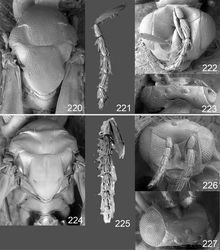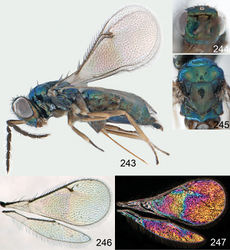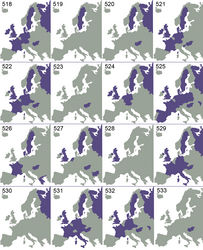Omphale sti
| Notice: | This page is derived from the original publication listed below, whose author(s) should always be credited. Further contributors may edit and improve the content of this page and, consequently, need to be credited as well (see page history). Any assessment of factual correctness requires a careful review of the original article as well as of subsequent contributions.
If you are uncertain whether your planned contribution is correct or not, we suggest that you use the associated discussion page instead of editing the page directly. This page should be cited as follows (rationale):
Citation formats to copy and paste
BibTeX: @article{Hansson2012ZooKeys232, RIS/ Endnote: TY - JOUR Wikipedia/ Citizendium: <ref name="Hansson2012ZooKeys232">{{Citation See also the citation download page at the journal. |
Ordo: Hymenoptera
Familia: Eulophidae
Genus: Omphale
Name
Omphale sti Hansson & Shevtsova, 2012 sp. n. – Wikispecies link – ZooBank link – Pensoft Profile
Material
Holotype female (BMNH), glued to a card, labelled “SWEDEN: Skåne, Lake Kranke, 17.vii.2004, C. Hansson”. Paratype. SWEDEN: 1♀ with same label data as holotype (BMNH).
Diagnosis
Female with flagellomeres 2-4 ventrally with one set of long setae attached subbasally and reaching beyond apex of flagellomere attached to (Fig. 225), and first flagellomere distinctly wider than second. Similar to Omphale phruron but midlobe of mesoscutum with two pairs of setae (Fig. 224); forewing speculum open below (Fig. 246); WIP different, medially with distinct lines (Fig. 247).
Description
Female. Length of body 1.3–1.5 mm. Antenna with scape yellowish brown with dorsal margin dark brown, pedicel and flagellum dark brown; pedicel + flagellum 1.8× as long as distance between eyes; first flagellomere 1.1× as long and 1.1× as wide as second flagellomere (Fig. 225); flagellomeres 2–4 ventrally with one set of long setae attached subbasally and reaching beyond apex of flagellomere attached to; clava 1-segmented. Face golden green (Fig. 244), with striae (Fig. 226); clypeus blue metallic, smooth, rectangular, 1.9× as wide as high; gena golden purple; lower frons bluish green metallic, with raised and weak reticulation, interscrobal area golden green with very weak reticulation; antennal scrobes join frontal suture separately; frontal suture V-shaped; upper frons golden, with very weak reticulation; vertex golden green, with engraved weak reticulation (Fig. 227). Occipital margin rounded (Fig. 227).
Mesoscutum golden green (Fig. 245), with engraved reticulation (Fig. 224), midlobe with two pairs of setae; notauli as indistinct impressions in posterior ½. Scutellum golden with green tinges (Fig. 245), with engraved reticulation (Fig. 224); 1.2× as long as wide, with anterior margin almost straight. Axillae golden with green tinges (Fig. 245). Dorsellum golden (Fig. 245), concave and smooth (Fig. 224), 0.2× as long as wide, and 0.3× as long as length of median propodeum. Entire lateral mesosoma purple metallic (Fig. 243); transepimeral sulcus curved forwards. Propodeum bluish green metallic (Fig. 245), smooth (Fig. 224); propodeal callus with two setae. Fore- and midcoxae yellowish brown, hind coxae purple metallic with apical ⅓ yellowish-brown (Fig. 243); femora pale brown; fore- and midtibiae pale brown, hind tibia yellowish brown; tarsi yellowish brown; midleg with first tarsomere 0.2× as long as length of tarsus. Forewing transparent, veins yellowish brown, setae dark brown (Fig. 246); speculum open; admarginal setae 5, arising from marginal vein; radial cell bare; stigmal vein slender; postmarginal vein 1.5× as long as stigmal vein. Hind wing transparent, apex pointed (Fig. 246). Forewing WIP (Fig. 247) with apical ⅓ yellow, basal ⅔ with wide bands in magenta, blue and yellow.
Petiole dark brown. Gaster with first tergite golden green, remaining tergites golden with purple tinges, elongate and 1.5–1.6× as long as length of mesosoma; 7th tergite 0.2× as long as length of gaster.
Male. Unknown.
Host
Unknown.
Distribution
Sweden (Fig. 519).
Etymology
Named after the Swedish Taxonomy Initiative, a commendable initiative that supports taxonomy and systematics in Sweden.
Original Description
- Hansson, C; Shevtsova, E; 2012: Revision of the European species of Omphale Haliday (Hymenoptera, Chalcidoidea, Eulophidae) ZooKeys, 232: 1-157. doi
Images
|


